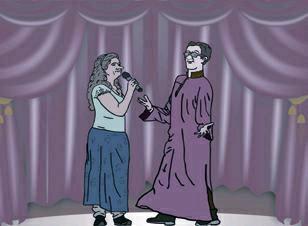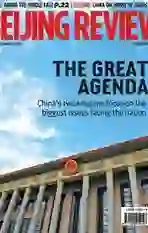A Very Chinese New Year Celebration
2014-03-18ByNickCompton
By++Nick+Compton
After living in Chinas capital for close to three years, Id like to think Ive become fairly familiar with Beijings Spring Festival routine. The subways and streets become deserted as millions of outof-towners leave for home and locals stay in to gather with friends and relatives, eat dumplings and watch the CCTV New Years Gala. There are hongbao envelopes and there are firecrackers. Endless firecrackers.
But this year, I was exposed to another uniquely Chinese tradition—the end-of-year work celebration.
The notion of an endof-year party is by no means
foreign to me. Back in the United States, when the holiday season rolls around, company celebrations are often perceived as a time to loosen your tie and roll up your sleeves—to have a drink or two on your bosss dime while you munch finger food and flirt with your cute cubicle mate. Almost always, these parties are unscripted and free-flowing. You mix, you mingle, you eat, and you drink.
So, when the supervisor at my company told me that we would be having an end-ofyear party, my eyes lit up. Then, before I could respond, he asked the inevitable. “Can you sing or dance, or do anything interesting?”
I am not the type of person who basks in the limelight. In fact, Im terrified of it. I cant sing, I cant dance, and I cant, to the best of my estimation, do anything interesting. So I tried to dodge my supervisors polite invitation, but eventually he caught up with me and asked again what I planned to perform. I shrugged my shoulders and said that I could write a short twoperson skit about cultural misunderstandings oreigners experience while living in China. He eemed happy.
s
The day of our celebration, our conference room was converted into a riot of colorful streamers and frills and Year of the Horse themed decorations. Candy and fruit were spread out on the tabletops, and the stage was readied for performances. Unlike the year-end celebrations back home, this one was carefully scripted, with guests assigned to seats and a host and hostess orchestrating the action. In addition to my colleagues, the room was filled by my colleagues young sons and daughters who wandered around the room winning smiles for their cuteness.
The celebration was much more lively than Id anticipated. The action started with a racy dance number by a few of my colleagues that featured top hats and long legs, and continued with singing and audience-led games. I watched, and although everything was in rapidfire Chinese, tried my best to understand the jokes and appreciate the high-spirits that every- one seemed to be in.endprint
Then, it came to my turn. Id attempted to memorize my lines in Chinese about bumbling as a foreigner at a Chinese supermarket, at a dinner table, and at the office, but when the time to speak in front of the audience came, many of the Chinese sentences escaped my mouth as a scrambled garble. My French colleague and skitmate did much better than me, and with her help, and a patient audience, we were able to complete our bit and even score a few laughs. Before I returned to my seat, I scanned the familiar faces of my colleagues in the audience and caught a few thumbs up.
After the skit, I was gently prompted into taking part in a few of the audience games—a blind-folded piggyback race and a humming contest where Id hum (or try to hum) the melody to famous tunes while listening to an iPad through earphones, and the audience would attempt to guess the song.
As the celebration wore on, I genuinely began to enjoy myself, and to enjoy the liveliness of the whole scene. The family atmosphere, and the laughs, and the loud applause and audience interaction made it hard not to smile and join in.
It was a fitting way to greet the Year of the Horse, and, knowing that I will be in China for some time to come, I have resolved to learn something “interesting,” to perform at any future end-of-year celebrations Im lucky enough to take part in.endprint
